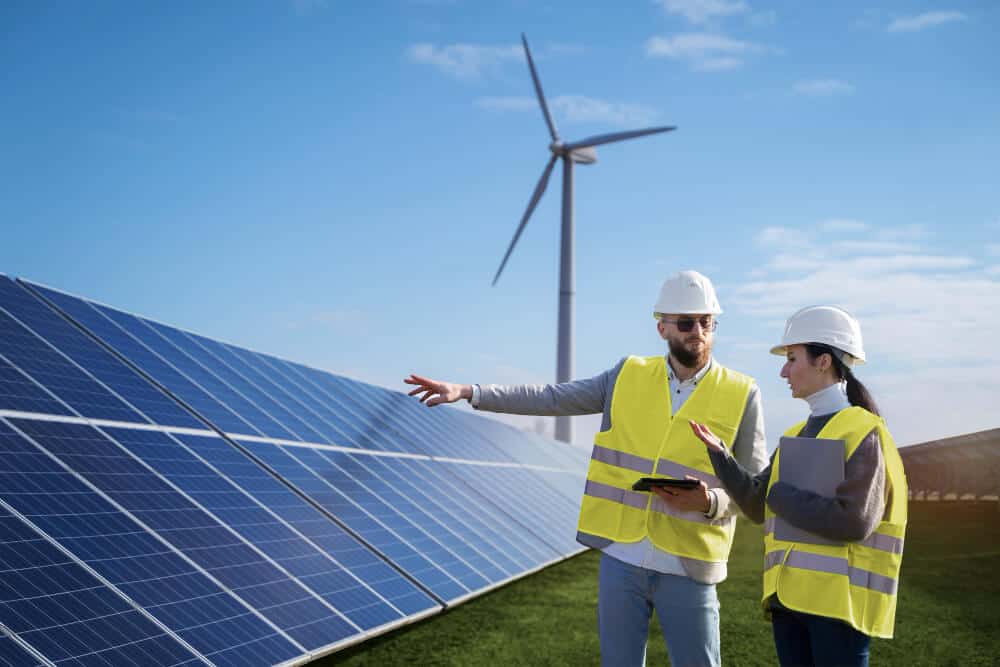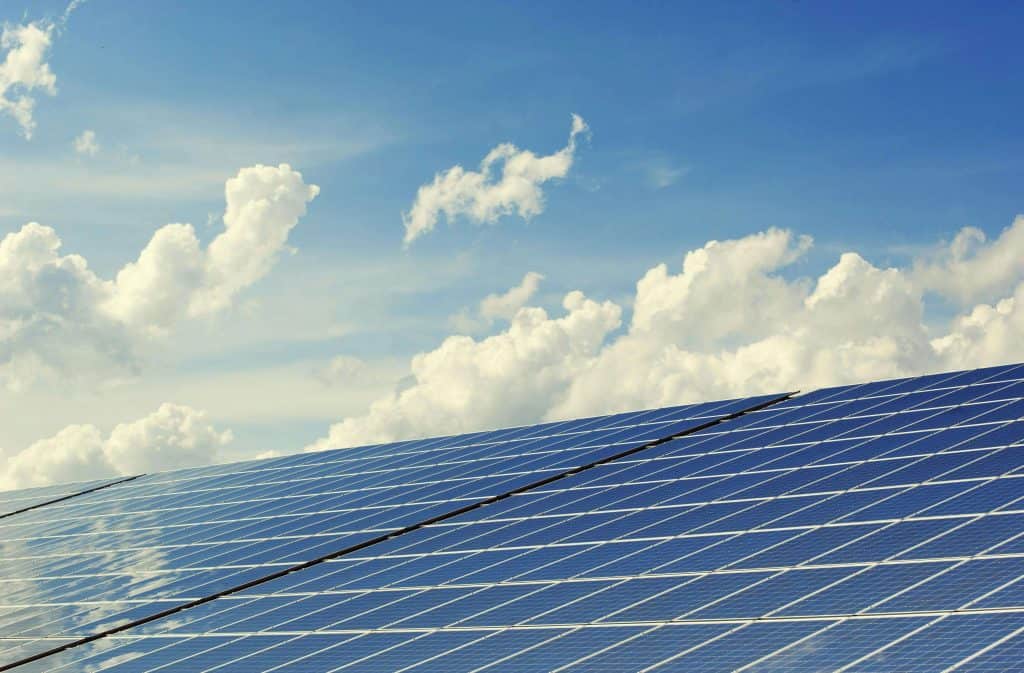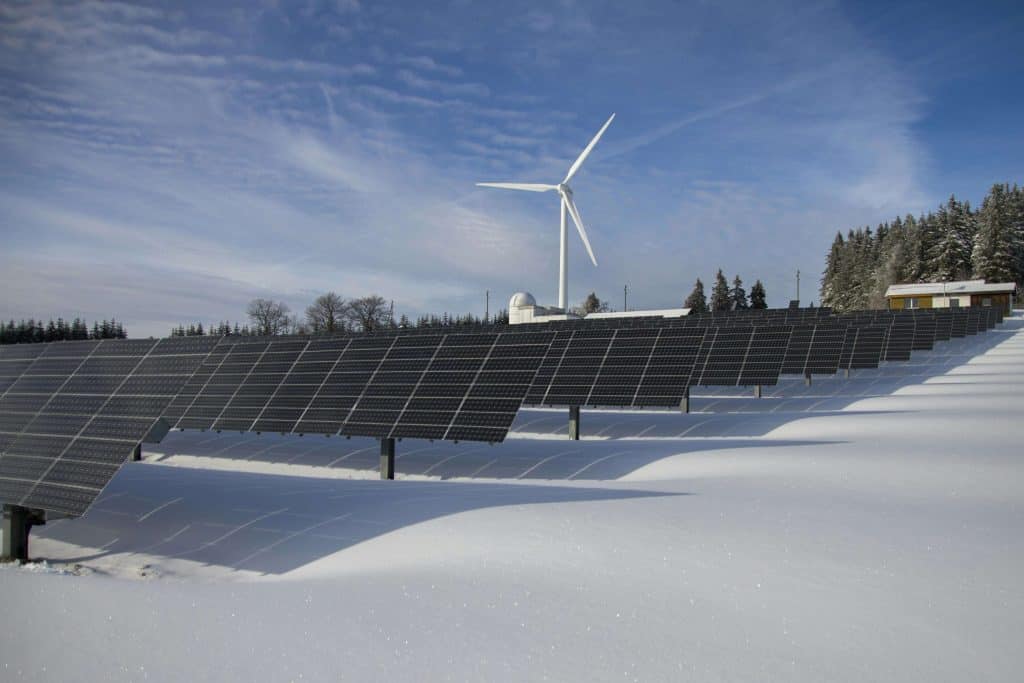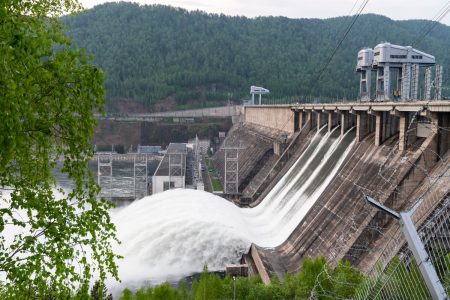
Renewable energy is energy obtained from natural resources that can be replenished. It is a sustainable alternative to fossil fuels.
Renewable energy sources, such as solar, wind, hydro, and geothermal power, are crucial in combating climate change and reducing greenhouse gas emissions. The shift towards renewable energy is vital for a clean and sustainable future. As technology advances and costs decrease, renewable energy is becoming more accessible and widespread.
Governments, businesses, and individuals are increasingly investing in renewable energy to mitigate environmental impacts and secure a reliable energy supply. Harnessing the power of renewables not only reduces our dependence on finite resources but also creates new job opportunities and drives economic growth in the green energy sector.
 When it comes to addressing the ever-growing energy demands, the importance of renewable energy sources cannot be overstated. Renewable energy, also known as green energy, is derived from sources that are naturally replenished and environmentally sustainable. Let’s explore the various types of renewable energy sources that hold the key to a cleaner, more sustainable future.
When it comes to addressing the ever-growing energy demands, the importance of renewable energy sources cannot be overstated. Renewable energy, also known as green energy, is derived from sources that are naturally replenished and environmentally sustainable. Let’s explore the various types of renewable energy sources that hold the key to a cleaner, more sustainable future.
 Renewable energy has gained significant attention in recent years due to its numerous benefits for our planet, economy, and energy security. By harnessing natural resources such as sunlight, wind, water, and geothermal heat, we can generate clean and sustainable power. As we explore the benefits of utilizing renewable energy, we delve into its positive environmental impact, economic advantages, and energy security. Let’s discover how renewable energy is shaping a brighter future for all.
Renewable energy has gained significant attention in recent years due to its numerous benefits for our planet, economy, and energy security. By harnessing natural resources such as sunlight, wind, water, and geothermal heat, we can generate clean and sustainable power. As we explore the benefits of utilizing renewable energy, we delve into its positive environmental impact, economic advantages, and energy security. Let’s discover how renewable energy is shaping a brighter future for all.
The Evolution Of Renewable Energy
Renewable energy has significantly transformed over the years. Let’s delve into the historical timeline and the technological advances that have shaped the landscape of renewable energy.Historical Timeline
- 1400s – Wind energy was harnessed for milling and pumping water.
- 1870s – The first solar cell was created by Charles Fritts.
- 1920s – Hydropower plants began to be widely used for electricity generation.
- 1970s – The modern wind energy industry emerged with the development of wind turbines.
Technological Advances
- Solar Panels – Photovoltaic technology improved solar panel efficiency.
- Wind Turbines – Advancements in blade design enhanced wind turbine performance.
- Hydropower – The integration of smart grid technologies optimized hydropower generation.
- Bioenergy – Biofuel production processes were streamlined for increased sustainability.
Types Of Renewable Energy Sources
 When it comes to addressing the ever-growing energy demands, the importance of renewable energy sources cannot be overstated. Renewable energy, also known as green energy, is derived from sources that are naturally replenished and environmentally sustainable. Let’s explore the various types of renewable energy sources that hold the key to a cleaner, more sustainable future.
When it comes to addressing the ever-growing energy demands, the importance of renewable energy sources cannot be overstated. Renewable energy, also known as green energy, is derived from sources that are naturally replenished and environmentally sustainable. Let’s explore the various types of renewable energy sources that hold the key to a cleaner, more sustainable future.
Solar Power
Solar power, derived from harnessing the energy of sunlight, is one of the most prominent and rapidly advancing forms of renewable energy. The use of photovoltaic cells to convert sunlight into electricity has revolutionized the way we generate energy, making solar power an essential component of the renewable energy landscape. As a clean and abundant resource, solar power has significant potential to meet our energy needs without depleting natural resources.Wind Energy
Another highly efficient renewable energy source is wind power. By harnessing the kinetic energy of wind through wind turbines, we can generate electricity without emitting harmful greenhouse gases. Constant advancements in wind turbine technology have led to increased efficiency and affordability, making wind energy a viable solution for meeting our energy demands in a sustainable manner.Hydroelectric Power
Hydroelectric power, generated from the gravitational force of falling or flowing water, is a tried and tested renewable energy source. The construction of hydroelectric power plants enables the conversion of water energy into electricity, making it a reliable and sustainable option for generating power while minimizing impact on the environment.Biomass Energy
Utilizing organic materials such as wood, crop residues, and organic waste to produce energy, biomass energy offers a renewable alternative to fossil fuels. By converting biomass into biofuels or utilizing it for direct combustion, we can reduce our reliance on non-renewable resources and mitigate the environmental impacts associated with traditional energy sources.Geothermal Energy
Geothermal energy, stemming from the heat within the earth’s crust, presents a consistent and low-emission energy solution. By tapping into the earth’s natural heat through geothermal power plants, we can generate electricity and heat in an environmentally friendly manner, thereby contributing to the reduction of greenhouse gas emissions and reliance on non-renewable fuels.Benefits Of Utilizing Renewable Energy
 Renewable energy has gained significant attention in recent years due to its numerous benefits for our planet, economy, and energy security. By harnessing natural resources such as sunlight, wind, water, and geothermal heat, we can generate clean and sustainable power. As we explore the benefits of utilizing renewable energy, we delve into its positive environmental impact, economic advantages, and energy security. Let’s discover how renewable energy is shaping a brighter future for all.
Renewable energy has gained significant attention in recent years due to its numerous benefits for our planet, economy, and energy security. By harnessing natural resources such as sunlight, wind, water, and geothermal heat, we can generate clean and sustainable power. As we explore the benefits of utilizing renewable energy, we delve into its positive environmental impact, economic advantages, and energy security. Let’s discover how renewable energy is shaping a brighter future for all.
Environmental Impact
Renewable energy sources have a significantly lower impact on our environment compared to traditional energy sources. By reducing our reliance on fossil fuels, we can mitigate greenhouse gas emissions that contribute to climate change. Harnessing solar power, wind energy, or hydropower produces no direct emissions, making it a cleaner and greener alternative. Moreover, renewable energy technologies help to conserve natural resources as they do not require the extraction, transportation, and processing of finite fuels such as coal, oil, or natural gas. This means less habitat destruction, biodiversity loss, and pollution associated with traditional energy production methods.Economic Advantages
The economic benefits of utilizing renewable energy cannot be overstated. By embracing renewable sources, we create a growing market for green technologies and job opportunities. This industry expansion stimulates economic growth, drives innovation, and fosters a more sustainable future. Furthermore, renewable energy systems can provide long-term cost savings. Harnessing the power of wind, water, or sunlight eliminates the volatility in energy prices commonly associated with fossil fuels. Renewables have a lower operational and maintenance cost compared to traditional power plants, reducing consumers’ energy expenses while promoting energy affordability and accessibility.Energy Security
Utilizing renewable energy sources enhances our energy security by diversifying our energy portfolio. Unlike fossil fuels, which are susceptible to price fluctuations, political tensions, and limited availability, renewable resources are widely available and abundant in nature. By embracing a renewable energy mix, we reduce our dependence on imported fuels, making our energy supply more self-reliant and resilient. This increased energy independence protects us from geopolitical instabilities and potential supply disruptions, ensuring a stable and reliable energy future for our communities and industries.Challenges And Solutions In Renewable Energy
In the pursuit of a cleaner and more sustainable future, renewable energy has emerged as a promising alternative to traditional fossil fuels. Harnessing natural resources such as sunlight, wind, and water, renewable energy offers a plethora of benefits including reduced carbon emissions and energy independence. However, this transition to renewable energy is not without its challenges. In this article, we will explore some of the key obstacles faced in the renewable energy sector and the innovative solutions being implemented to overcome them.Intermittency Issues
One of the primary challenges in renewable energy is the issue of intermittency. Unlike conventional power sources, such as coal or natural gas, renewable energy generation heavily depends on variable weather conditions. This variability, especially concerning solar and wind power, can lead to inconsistent energy output, making it difficult to meet the demands of the grid at all times. To address this challenge, researchers and engineers are working on developing advanced forecasting tools that provide accurate predictions of renewable energy availability. By leveraging meteorological data and sophisticated algorithms, these tools enable better planning and management of intermittent resources. Additionally, energy storage technologies play a crucial role in mitigating intermittency. Battery energy storage systems are being deployed to store excess renewable energy during periods of high generation, allowing it to be used during times of low generation, thus ensuring a more consistent and reliable power supply.Storage Challenges
Another hurdle in the widespread adoption of sustainable energy is the issue of storage. Unlike fossil fuels, which can be easily stored and transported, energy sources require efficient storage systems to account for fluctuations in supply and demand. Current storage technologies face limitations in terms of scalability, cost, and environmental impact, hindering the seamless integration of renewable energy into the grid. Fortunately, advancements in energy storage are rapidly evolving, presenting promising solutions. For example, innovative technologies like pumped hydroelectric storage and compressed air energy storage are gaining traction due to their ability to store large quantities of energy for extended periods. Furthermore, ongoing research is focused on exploring the potential of emerging technologies such as hydrogen storage and flow batteries, which offer high energy density and enhanced efficiency.Infrastructure Requirements
Lastly, the transition to energy necessitates significant infrastructural investments. Expanding the energy capacity requires not only the development of new power plants but also the construction or modification of transmission and distribution networks to facilitate the transportation of energy from remote locations to populated areas. To overcome this challenge, governments and corporations are actively investing in grid modernization initiatives. These initiatives aim to upgrade and expand existing transmission infrastructure, integrate smart grid technologies, and enhance system flexibility. Additionally, international collaborations are being fostered to facilitate the sharing of best practices and resources, supporting the development of a robust and interconnected sustainable energy infrastructure on a global scale.Global Initiatives Towards Renewable Energy
This energy has become a focal point in addressing the global energy transition. Global initiatives towards renewable energy aim to mitigate climate change and ensure sustainable energy sources for the future. Such initiatives encompass various commitments and targets set by international organizations and individual countries to spur the adoption of sustainable energy solutions.Paris Agreement Commitments
The Paris Agreement, a landmark international treaty, has galvanized efforts to combat climate change by limiting global warming. It sets forth nationally determined contributions (NDCs) where countries pledge specific climate actions, including energy adoption. These commitments signify a collective push towards embracing cleaner energy sources and reducing greenhouse gas emissions.National Renewable Energy Targets
Countries across the globe have established ambitious national energy targets to bolster their energy mix and promote sustainability. These targets typically entail plans for increasing the share of renewable energy in the overall energy generation. Bold national initiatives work towards harnessing the power of wind, solar, hydro, and other renewable sources to diversify energy portfolios and reduce dependency on fossil fuels.Innovations And Future Trends
Energy is rapidly evolving, with continuous advancements paving the way for a greener future. Innovations and future trends in the renewable energy sector hold immense promise for a sustainable world. Let’s explore some of the exciting developments in smart grid technologies, energy efficiency measures, and emerging technologies.Smart Grid Technologies
Smart grid technologies play a crucial role in optimizing energy systems and enabling efficient energy management. These technologies integrate advanced metering, monitoring, and control systems, facilitating seamless communication between power producers and consumers. By utilizing real-time data, smart grids enhance energy distribution, reduce energy wastage, and enable effective load management. Implementing a smart grid provides numerous benefits, such as improved grid reliability, cost savings, and reduced carbon emissions. Advanced technologies, such as smart meters, demand response systems, and grid sensors, empower consumers to make informed decisions about their energy consumption. Therefore, the integration of smart grid technologies not only promotes sustainability but also empowers individuals to actively participate in the energy transition.Energy Efficiency Measures
Enhancing energy efficiency is an essential aspect of achieving a sustainable energy future. Energy efficiency measures focus on maximizing output while minimizing energy consumption. By adopting energy-efficient practices and technologies, we can reduce our ecological footprint and optimize resource utilization. Energy efficiency measures encompass various strategies, including insulation improvements, energy-efficient appliances, LED lighting, and behavior changes. These simple yet impactful actions significantly reduce energy wastage and contribute to overall energy conservation. Additionally, businesses and industries can implement energy management systems to track and optimize their energy usage, leading to substantial cost savings and a more sustainable business model.Emerging Technologies
The solar energy landscape is constantly evolving, driven by emerging technologies that push the boundaries of innovation. These technologies hold immense potential to revolutionize how we generate and utilize clean energy. Let’s take a brief look at some of the notable emerging technologies:- Bioenergy: Harnessing energy from organic matter, such as agricultural waste and biomass, presents a renewable and carbon-neutral energy solution.
- Solar Power Innovations: Advancements in solar technologies, including solar skin technology and solar paint, aim to seamlessly integrate solar energy generation into everyday surfaces.
- Wind Power Enhancements: Development of larger, more efficient wind turbines and offshore wind farms enables the generation of more electricity from wind energy.
- Hydrogen Fuel Cells: Hydrogen fuel cells offer a clean and efficient alternative for storing and generating electricity, with applications in transportation and power production.



